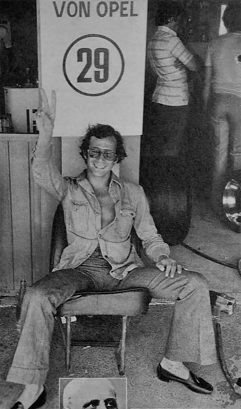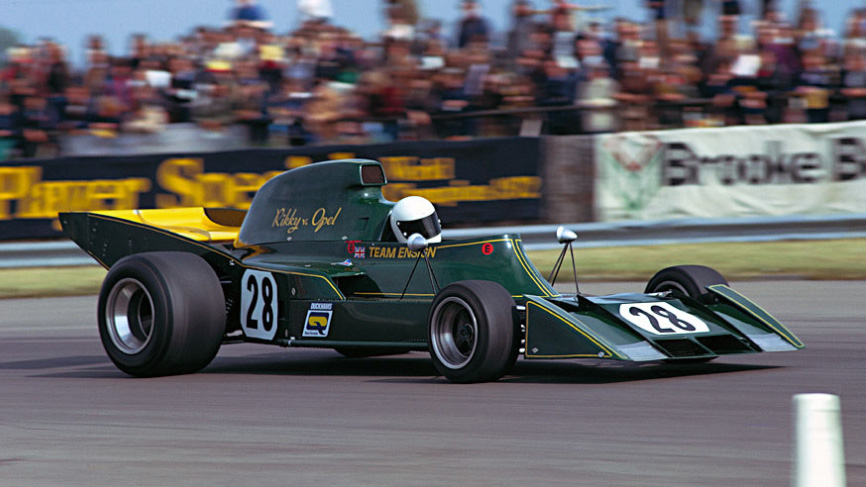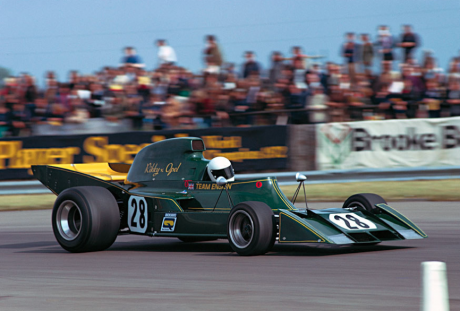“I know very well that bad drivers drive too fast,
while good ones are too cautious. For me, it’s a matter of
finding the right balance between reason and recklessness!”
—— Frederick ‘Rikky’ von Opel ——

Victory pose: Rikky von Opel at the German Grand Prix held at the Nürburgring complex in 1973.
Those are the words that Rikky von Opel used to describe his aim to conquer Formula 1 at the beginning of the 1970s. Incidentally, these two sentences also provide good insight into his lifestyle, which was marked by a healthy portion of recklessness.
He inherited a feisty spirit: Rikky is the son of the legendary ‘Rocket Fritz,’ who made automotive history in 1928 with the equally famous Opel RAK2 at the Avus Track in Berlin, Germany. Rikky was born in 1947 in New York and christened ‘Frederick.’ His mother, Emita Herrán Olozaga, was the daughter of a Colombian diplomat and the second wife of the famous grandson of Adam Opel. Rikky spent his childhood in St. Moritz and went off to school in England. As his companion Lona Haberberger recounts in Carlo von Opel’s collection of stories and anecdotes about the von Opels, Rikky’s fiery South American temperament won out over his staid German engineering genes from an early age. As a teenager, Rikky and his friends would secretly make off with a bobsled at night and race it down the St. Moritz-Celerina Olympic Bobrun. Whenever they would reach a curve on the track, he would yell “Don’t brake, don’t brake!”
British Formula 3 champion
Later on Rikky von Opel switched to motor vehicles, and put his driving skills to the test for this first time in his early 20s at the Formula Ford 1600. He started off at the Formula Ford 2000, known as a breeding ground for promising young talent such as Michael Schumacher and Mika Häkkinen. The British Formula 3 Championship has a similar reputation – and Rikky von Opel won it in 1972. There, he competed under his real name for the first time; he had been going by ‘Antonio Bronco’ up until that point. Apparently, he didn’t want to drive non-Opel cars while competing under his real name.
His biggest dream, competing in Formula 1, came true after he invested nearly all of his personal fortune in the British Ensign racing team. The team owner, Mo Nunn, put together the ‘Ensign MN01’ for Rikky, a monocoque with a Ford Cosworth DFV8 engine and Hewland FGA400 transmission. Painted a dark shade of British racing green and decorated with narrow golden stripes, this wasn’t the best racecar to zoom down racetracks in those times, but it was certainly one of the most stylish.
500 German marks lost in a bet
“A nice, crazy guy,” said motor sports legend Huschke von Hanstein of Rikky von Opel after the two first met. This assessment implies that von Hanstein liked his fellow aristocratic motorsports enthusiast, but didn’t put much past him. In keeping with this opinion, von Hanstein bet 500 German marks against the young von Opel, telling him: “You’ll never qualify for the French Grand Prix in Le Castellet.” Von Hanstein lost the bet.
Rikky von Opel competed in Formula 1 races in his Ensign a total of six times. Thanks to his famous last name, he attracted a great deal of media interest at the German Grand Prix held at the Nürburgring complex. Even though he is officially a Liechtensteiner by nationality, he proclaimed to the sporting press before the race began that “When I win, I want to hear the German national anthem.” I didn’t come to that, though – there were cracks in the chassis of his racecar, so the racing team withdrew it from the race, citing safety concerns.
Formula 1 results: two ninth-place wins
In the following season he switched to Brabham, and competed for them four times before bringing his Formula 1 career to an end. His biggest achievements were two ninth-place wins for Brabham. He also remains the only Formula 1 driver to ever represent Liechtenstein in the history of motorsports.
His life did not become any less exciting after his racing career came to an end. Von Opel is a firm staple of the global jet set: He is the cousin of Gunter Sachs and was a close friend of Alexander Onassis, the son of the billionaire shipping magnate Aristoteles. Later in life, von Opel became preoccupied with matters of philosophy and relocated to Thailand. Little has been heard from him since.
“Rikky was always up for anything you might call crazy,” recalls Lona Haberberger in Carlo von Opel’s collection of anecdotes. And when people would ask him what he’d gotten up to this time around, he would answer: “Why are you asking me if you don’t want me to lie to you?”

